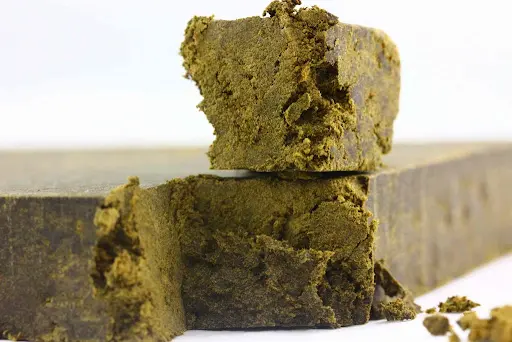Hacher
Quels sont les effets du haschisch sur votre corps ? Effets, bienfaits et risques
Hashish or hash is a kind of marijuana product that is made from the resinous trichomes of the marijuana plant. It comes with a solid psychoactive effect on the individual’s mind and body due to its high concentration of THC. Moroccan Habibi Hash, for instance, is used for potential therapeutic benefits with short-term effects; with this, a user must know the answer to the question, “What Does Hash Do to Your Body?”.
What Does Hash Do to Your Body?
Immediate Effects
When the hash is taken, be it smoked or ingested, the body has several ways of quickly affecting it.
- Euphoria and Relaxation: THC (tetrahydrocannabinol), the primary psychoactive compound in the hash, binds to cannabinoid receptors in the brain, leading to euphoria, deep relaxation, and an overall sense of well-being.
- Altered Perception: Consuming hash can impair motor skills and coordination, making activities requiring precise motions or quick reflexes difficult. This can influence things such as driving or playing sports.
- Increased Appetite: Hash consumption can impair motor skills and coordination, making tasks requiring precise movements or quick reflexes more challenging to perform effectively. This can affect activities ranging from driving to sports.
Short-Term Effects
After consuming hash, users may experience the following short-term effects:
- Cognitive Impairment: The effect of THC on short-term memory may well explain why it can be challenging to remember what was said or heard recently and to do office work properly. Indicatively, impairments in short-term memory may lead to poor decision-making abilities alongside decreased reasoning speeds, thus affecting personal life in general.
- Coordination: A hash intake may affect one’s motor skills and coordination. This implies that tasks that require accurate moves or urgent reactions might be very hard to perform properly. Hence, it can interfere with activities that involve driving or sports.
- Heart Rate: THC temporarily elevates heart rate, but some people are at more risk for feeling anxious or uneasy because of the fact that they are more sensitive to sudden changes in the heart rate or because they are predisposed to panic attacks.
Long-Term Effects
Here is the list of long-term effects due to continuous use of hash:
- Respiratory Issues: Similar to smoking cannabis, inhaling hash smoke can irritate the respiratory system. Over time, chronic bronchitis may affect lung health by causing coughing, wheezing, and other symptoms.
- Addiction Potential: While hash is considered less physically addictive than some substances, psychological dependence can develop with frequent use. Mindful usage remains vital for overcoming the difficulty of reducing intake, withdrawal after-abstinence symptoms, or even addiction cravings encountered by users.
- Impact on Mental Health: The use of hash may worsen symptoms of any already existing mental ailment, for instance, anxiety, depression, or even psychotic conditions. The drug should not be used without great caution because it can lead to the worsening of someone’s health or a bent backward in others who respond quickly.
How is Hash Made?

Hashish, commonly named hash, is made by taking out resinous trichomes from cannabis flowers and pressing them hard to form a thick substance. What happens here is that trichomes are separated from the plant material, which contains cannabinoids, such as tetrahydrocannabinol (THC), against cannabidiol (CBD). Methods involved in the initial extraction are either ice-water or dry sifting. Dry sifting entails shaking cannabis buds over screens to collect trichomes, a meticulous process that requires time and effort. Conversely, ice-water extraction immerses buds in cold water to freeze trichomes, which are then filtered out for a higher potency hash, albeit requiring specialized equipment.
After gathering, trichomes are squeezed into solid blocks or cakes through pressurization done manually or through machines. Apart from compressing trichomes into solid drug bricks, pressing aids in the hash’s preservation and transportation. Provided it is produced by hand or through machinery, hash delivers a powerful cannabis item that is well-regarded due to its unique ways of consuming it and its concentrated effects.
Health Benefits of Hash
Le advantages for health linked with hash are due to an abundance of cannabinoids, primarily THC and CBD. These elements are beneficial in bettering chronic ailments like muscle spasms, inflammations, and pains, hence providing an alternative to standard drugs. Nausea and vomiting cases can be managed using hash, which significantly helps those who undergo chemotherapy or suffer from other gastric problems. Additionally, cannabinoids have shown promise in reducing seizures in specific types of epilepsy, highlighting potential therapeutic applications.
Besides, hash can control hunger, and it can be crucial to people with health problems to reduce hunger as it provides symptomatic relief and promotes the general state of health. Hash is rich in highly concentrated cannabinoids, which not only aim at physical symptoms but also work on an emotional level by alleviating the problems that are hidden beneath those symptoms. These therapeutic benefits make hash a valuable option in medical cannabis treatments, offering patients alternatives to pharmaceuticals with potentially fewer side effects.
Risks and Considerations

In deciding whether or not to use hash, legal implications are vital because it differs significantly in regions. The users must be aware of the existing local laws that pertain to owning and using it so that they don’t find themselves on the wrong side of them. As far as health is concerned, hash is less physically addictive compared to other drugs, but its frequent use could promote psychological-related dependency issues.
Moreover, prolonged smoking of hash may result in respiratory problems like chronic bronchitis, similar to those associated with smoking cannabis. Individuals with pre-existing mental health conditions should also exercise caution, as hash use has the potential to worsen symptoms of anxiety, depression, or psychosis in susceptible individuals. Being aware of these factors ensures informed decision-making and responsible use of hash.
So, What Does Hash Do To Your Body?
Understanding “What Does Hash Do to Your Body?” reveals its potential benefits and risks. Hash, rich in THC and cannabinoids, induces immediate sensations of euphoria, altered perception, and increased appetite. However, short-term effects like cognitive impairment, coordination issues, and increased heart rate underscore the need for moderation and awareness during consumption. Long-term use can lead to respiratory complications, addiction risks, and potential impacts on mental health.
Despite these factors, hash has been associated with recognizable health benefits such as the alleviation of pain, combating nausea, possible treatment of epilepsy, and enhancement of appetite. One should always take responsibility while consuming any substance to ensure that it is safe and has valuable effects on the individual’s health without compromising legality, which may make life difficult for them. And remember, the right amount of Hash is essential to follow, especially when it’s your first time.
